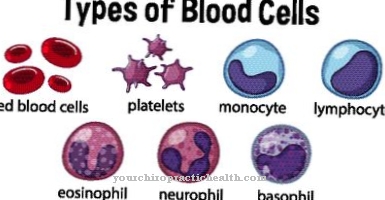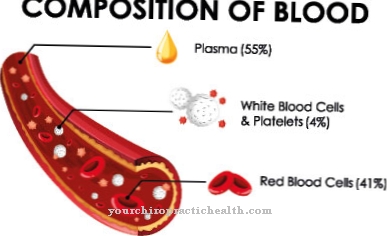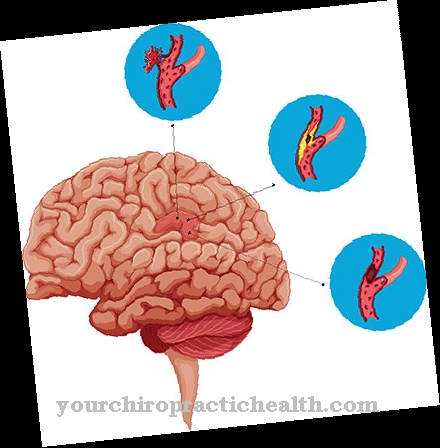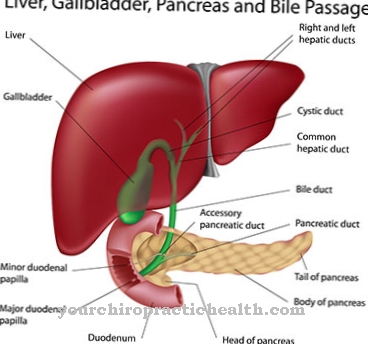Various forms of menstrual disorders, such as heavy or weak menstruation, can occur in every woman in all walks of life without a pathological background. However, if the period does not occur over a longer period of time, the gynecologist speaks of one Amenorrhea. The causes are varied, the therapy is based on the cause with hormones.
What does missed period mean?

© fancytapis - stock.adobe.com
The term amenorrhea is derived from the Greek words a ("without"), menos ("month") and rhoe ("flow") and denotes the absence of menstrual bleeding.
A fundamental distinction must be made between the pathological absence of menstruation and natural, physiological amenorrhea. The latter occurs before the first period, i.e. in childhood and puberty, during pregnancy and breastfeeding and in the postmenopause and is not a problem for women.
Any form of amenorrhea that occurs in sexually mature women is referred to as a menstrual cycle disorder requiring treatment. Gynecologists differentiate between primary and secondary amenorrhea.
Primary amenorrhea is diagnosed when young women have not had a period after their 16th birthday. Secondary amenorrhea is the absence of periods in women who have had menstruation for more than three months.
causes
A number of causes can be responsible for missing your period. The most important organic causes of amenorrhea are disorders of the ovarian function, as can occur in ovarian inflammation and polycystic ovary syndrome. A hymen that is too dense can also cause amenorrhea.
Other possible causes for missing a period are metabolic diseases and hormonal disorders. These include hypothyroidism and adrenal hypofunction and diseases of the pituitary gland.
The best known non-organic causes are stress and long-term psychological stress. The climate change after moving abroad also upsets the female hormone balance and, like taking medication and stopping the pill, can lead to amenorrhea. A risk factor for missing your period is also being severely underweight, as can occur with anorexia or bulimia.
You can find your medication here
➔ Medicines for menstrual crampsSymptoms, ailments & signs
By definition, one speaks of a missed period if the period in a cycle fails completely. If it occurs a few days late, it is not a failure, but a delay. If you miss your period, you will notice that there is no menstrual period at the expected time.
The most common cause of missed periods is pregnancy. But even under great stress, emotional strain and more generally, also physical overload, the period can miss. Other reasons can be a lack of certain nutrients and minerals. In this case, a blood count will provide information.
If you miss your period, the typical period pains also disappear. The symptoms of the PMS preceding the period, the premenstrual syndrome, can still occur. During menopause, the period becomes irregular at first, then stops more and more until it stops completely at the end.
This is a completely natural development and is not a cause for concern. Nevertheless, the gynecologist should be consulted for a reliable diagnosis. A constantly irregular period, which now and then fails completely, is also no cause for concern. The causes can usually be found quickly and remedied with suitable therapy.
Diagnosis & course
To make a diagnosis and find the cause, the gynecologist must first take a detailed medical history. The gynecologist needs to know when the first period occurred, what her cycle behavior has been like in the last few months, whether the patient is aware of metabolic disorders or familial risks, which medication the patient is taking and whether there is any psychological stress.
Often those affected have to keep a cycle diary for several weeks or months in which the morning body temperature and cycle-related abnormalities are entered. A gynecological examination of the vagina, uterus and ovaries, often using imaging techniques, is also revealing.
Examination of the blood and urine can also provide clues about the cause of the amenorrhea. With adequate therapy, there is a good chance that the cycle will normalize quickly.
Complications
The absence of a period (amenorrhea) can have many reasons; some of them can lead to complications. First of all, of course, you may be pregnant, which must be confirmed by a doctor in order to avoid problems later. Complications can arise if the egg has not implanted inside the uterus, as there is a risk of a potentially life-threatening ectopic pregnancy.
Failure to have a menstrual period as a result of a hormonal disorder can, if left untreated, lead to further psychological illnesses and various complications. If the symptoms are based on a tumor, the possible complications range from a reduction in well-being and pain to infections and other secondary diseases. Amenorrhea before menopause usually causes a decrease in fertility and is associated with various physical and hormonal changes.
Depending on the constitution of the woman and the severity of the amenorrhea, this can lead to a variety of complications such as premature aging and stress disorders. Chronic missed periods (secondary amenorrhea) can be attributed to various underlying conditions such as narrowing of the pituitary gland or circulatory disorders. Possible complications range from feeling unwell to unwanted pregnancy. Since the complications in the absence of the rule are as diverse as the possible underlying ailments, amenorrhea should always be clarified by a gynecologist.
When should you go to the doctor?
Missing your period is not necessarily a reason to see a doctor in and of itself. Rather, the absence of a period should be classified in the individual health situation. The monthly cycle is not yet regular, especially in very young women during puberty. But this has no disease value. After giving birth, while breastfeeding or during periods of very stress, you may miss your period due to an altered hormonal level.
As long as there are no further abdominal complaints, you can wait a few cycles and give the body the chance to regenerate itself. However, if the period does not start by itself and abdominal pain occurs, a pelvic exam is advisable.
On the one hand, a missed period can indicate an unexpected pregnancy, which must be accompanied by a doctor. On the other hand, in rare cases, the bleeding may stop due to benign or malignant neoplasms in the abdomen. Since early detection plays an important role here, it makes sense to see a doctor as soon as possible.
Doctors & therapists in your area
Treatment & Therapy
The treatment of amenorrhea is cause-related and individually tailored.
If the cause is a hormone disorder, the attending physician will initiate hormone therapy to normalize the hormone level and thus stabilize the cycle. When it comes to the dosage and determination of the hormones to be administered, the precise horn disorder present is decisive, because the therapy of hypothyroidism, for example, requires different hormones than the adrenal disorder.
If there is a disorder of the organ function, an operative therapy must be considered. A hymen that is too dense can be pierced by the gynecologist, other organic causes must be removed under general anesthesia.
The treatment of psychological or stress-related amenorrhea takes place, depending on the severity, with measures to rest and relax the person concerned. Psychotherapy should also be considered. If there is severe psychological stress, the administration of psychotropic drugs can be considered in order to stabilize the patient again. However, due to the risk of side effects, this must be carefully considered.
The therapy of anorexia or bulimia is lengthy and requires learning of healthy, cycle-sparing nutritional behavior and psychotherapeutic measures.
Outlook & forecast
According to the fact that a distinction is made between primary and secondary amenorrhea, the prognoses are also very different. The only case that allows a clear prognosis is the onset of menopause in women: it cannot be assumed that the period will return. Individual menstrual periods can, however, still take place during the hormonal change. Eventually she succumbs completely after a few years. Pregnancy and breastfeeding are also temporary inhibitions for your period.
Primary amenorrhea usually has organic or hormonal causes and can be treated surgically or with hormone therapy. If the organs involved are functional, but inhibited, for example, by a correctable malformation or due to incorrectly controlled hormones, the prognosis is good. Such malfunctions can often be corrected. The situation is different if parts of the woman's fertility apparatus are incorrectly or not functionally developed.
Secondary amenorrhea can have numerous causes, ranging from malnutrition and pregnancy to psychological distress. Climatic changes can also be considered as a factor. The prognosis is based solely on the cause, although many environmental factors can be offset. A normalization of the psychological stress or a change in diet are usually sufficient to start the period again. Tumors, infections, etc. are another factor. The menstrual period can often return after treatment.
Persistent amenorrhea that cannot be traced back to pregnancy, menopause or breastfeeding means, if the treatment is unsuccessful, a loss of fertility in the woman, which can have further psychological consequences.
You can find your medication here
➔ Medicines for menstrual crampsprevention
In principle, menstrual cycle disorders cannot be demonstrated.However, a healthy lifestyle and diet appear to minimize the risks of developing amenorrhea.
Aftercare
If you miss your period, you don't have to be ill. The absence of menstruation is quite normal during pregnancy and breastfeeding. It is similar in menopause. Follow-up care does not make sense here because there is no disease. The situation is different with other causes. There are a number of options.
The doctor will perform palpation examinations. Ultrasound images and computed tomography lead to a final result. After missing your period, it can happen again for the same or different reasons. The body does not build immunity. The aim of aftercare should also be to prevent complications.
Missing periods usually occurs in the context of other complaints. If there are no hormonal problems, long-term hormonal treatment usually follows. If, on the other hand, emotional difficulties are decisive, the doctor can order psychotherapy. If tumors lead to a lack of menstruation, surgery or chemotherapy are sometimes necessary.
General behavior tips for a normal menstrual period are difficult to formulate. Sometimes medical professionals use the term balance. Those who find their inner center, eat a balanced diet, do sports and maintain social contacts usually build up a regular cycle.
You can do that yourself
If you miss your period, you should first speak to your gynecologist, e.g. rule out a disease or pregnancy. In addition, a healthy diet is particularly recommended. Fruits and vegetables, legumes as well as whole grains and nuts regulate the intestinal flora and thus usually also normalize the cycle. Digestive foods such as flaxseed or plums can also help.
Natural remedies such as maca can help with hormonal imbalances. The root from the Andes can be taken as a powder or in the form of capsules and is effective in promoting menstruation. If your missed period is caused by stress or emotional problems, calming herbs such as lemon balm, passion flower, linden blossom or valerian can help. Bach flowers also counteract emotional complaints in a natural way.
In order to achieve a normal menstrual period in the long term, however, the triggers of the symptoms should also be eliminated, for example by changing the environment or occupation or by talking to a therapist. Finally, the cycle can be regulated by light. The so-called "moon conception", during which you sleep in different light conditions during the cycle, can stimulate ovulation and work against missing your period.












.jpg)



.jpg)










.jpg)
